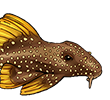I came upon this new paper on the effects of nitrates and other nitrogen products on health and reproduction. Certainly, it is not advocating we stop water changes. But the inconsistent experiences some of us have had (e.g., fish spawning in spite of higher than acceptable nitrate levels) may be partially attributable to this phenomenon.
Edwards, T. M., & Hamlin, H. J. (2018). Reproductive Endocrinology of Environmental Nitrate. General and Comparative Endocrinology. Https://doi.org/10.1016/j.ygcen.2018.03.021
HighlightsABSTRACT
- Exogenous nitrate contributes to endogenous production of nitrite and nitric oxide.
- Nitrate, nitrite, and nitric oxide can both stimulate and inhibit steroidogenesis.
- Hypoxia, dose, duration, and reproductive stage of study animals affect results.
- Nitrate pharmacology likely follows a non-monotonic dose response curve.
- Studies of nitric oxide synthase (NOS) pathways exclude nitrate as an NO source.
Nitrate is a widespread contaminant of aquatic ecosystems and drinking water. It is also broadly active in organismal physiology, and as such, has the potential to both enhance and disrupt normal physiological function. In animals, nitrate is a proposed endocrine disrupter that is converted in vivo to nitrite and nitric oxide. Nitric oxide, in particular, is a potent cell signaling molecule that participates in diverse biological pathways and events. Here, we review in vivo nitrate cycling and downstream mechanistic physiology, with an emphasis on reproductive outcomes. However, in many cases, the research produces contradictory results, in part because there is good evidence that nitrate follows a non-monotonic dose-response curve. This conundrum highlights an array of opportunities for scientists from different fields to collaborate for a full understanding of nitrate physiology. Opposing conclusions are especially likely when in vivo/in vitro, long term/short term, high dose/low dose, or hypoxia/normoxia studies are compared. We conclude that in vivo studies are most appropriate for testing an organism’s integrated endocrine response to nitrate. Based on the limited available studies, there is a generalized trend that shorter term studies (less than 1 month) or studies involving low doses (≤5 mg/L NO3-N) cause steroid hormone levels to decline. Studies that last more than a month and/or involve higher, but still environmentally relevant, exposures (>50–100 mg/L NO3-N) cause steroid hormone levels to increase. Very high nitrate doses (>500 mg/L NO3-N) are cytotoxic in many species. Hypoxia and acidity are likely to intensify the effects of nitrate. For study design, degree of study animal reproductive maturity or activity is important, with immature/reproductively quiescent animals responding to nitrate differently, compared with reproductively active animals. A detailed table of studies is presented.




